

Fab lab. Un fab lab (contraction de l'anglais fabrication laboratory, litt. « laboratoire de fabrication ») est un tiers-lieu de type makerspace[1] cadré par le Massachusetts Institute of Technology (MIT) et la FabFoundation[2] en proposant un inventaire minimal[3] permettant la création des principaux projets fab labs, un ensemble de logiciels et solutions libres et open-sources, les Fab Modules[4], et une charte de gouvernance, la Fab Charter[5].
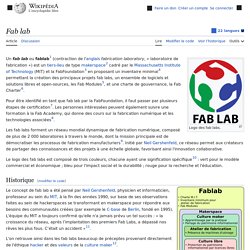
Le logiciel libre et son état d'esprit inspirent déjà l'éducation de demain. What happens when you turn a middle school library into a hackerspace? Guest article by Thomas Maillioux above: David designs an animation for his LoL Shield with LoL Shield Theater Editor’s note: Several months ago I put a call out on this blog for a DIY electronics blogger, and I couldn’t believe how many funny, friendly, fantastically qualified people from all over the world responded.
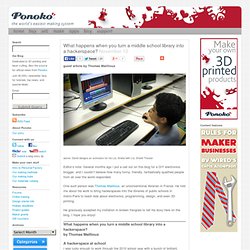
One such person was Thomas Maillioux, an unconventional librarian in France. He told me about his work to bring hackerspaces into the libraries of public schools in metro-Paris to teach kids about electronics, programming, design, and even 3D printing. Prismes-numero-15-2011-hep-vaud.pdf. Library builds a hackerspace. Marcin Jakubowski: Open-sourced blueprints for civilization. For the price of a TV you can start a FabLab. This Christmas season you could buy a loved one an HDTV, a low end MacBook, or a suite of tools that enable them to create anything they can imagine.
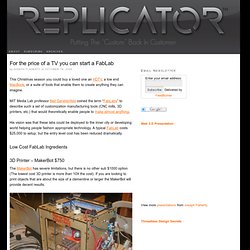
MIT Media Lab professor Neil Gershenfeld coined the term “FabLabs” to describe such a set of customization manufacturing tools (CNC mills, 3D printers, etc.) that would theoretically enable people to make almost anything. His vision was that these labs could be deployed to the inner city or developing world helping people fashion appropriate technology. A typical FabLab costs $25,000 to setup, but the entry level cost has been reduced dramatically. The rise of the global Fablab concept. "Makers", le roman qui prône la révolution par le bricolage. FabLabs : refabriquer le monde. Bienvenue dans le monde des « fabs labs » !
Dans les ateliers libres du futur tout objet produit est en bêta. Le Grand Emprunt booste les fab labs. Digital badges could help measure 21st-century skills. Government, industry launch nationwide call to innovators to create ‘digital badges’ that can verify digital skills By Meris Stansbury, Online Editor Read more by Meris Stansbury TopCoder, an adviser for the MacArthur Foundation’s competition, currently has a badge system for its community members that validates skills and competencies. How can schools accurately measure and categorize a student’s 21 st -century skills? The MacArthur Foundation hopes to solve this problem with a new competition that calls on participants to create what is known as a “digital badge.” Digital badges and the digital badge system would, advocates say, help define the skills and knowledge students pick up in an informal way, such as through internships, online courses, open courseware, competitions, and much more.
The competition calls for leading organizations, learning and assessment specialists, designers, and technologists to create and test digital achievement badges and badge systems. 1. Une pédagogie alternative de la technologie. Patrick Plante est doctorant en technologie éducative à l’Université Laval.
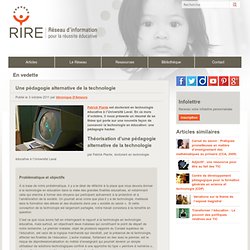
En ce mois d’octobre, il nous présente un résumé de sa thèse qui porte sur une nouvelle façon de concevoir la technologie en éducation: une pédagogie hacker. Hackons l’école ! À l’occasion de la rentrée, OWNI hacke l’Education nationale.
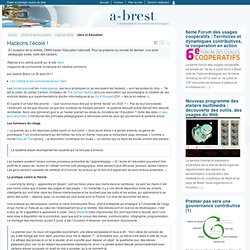
Pour se préparer au monde de demain, une autre pédagogie existe, celle des hackers. Reprise d’un article publié sur le site Owni magazine de journalisme numérique en creative commons. Hackons l’école ! À l'occasion de la rentrée, OWNI hacke l'Education nationale.
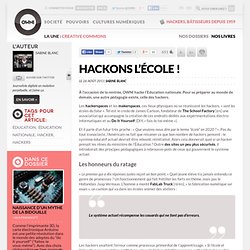
Pour se préparer au monde de demain, une autre pédagogie existe, celle des hackers. Les hackerspaces et les makerspaces, ces lieux physiques où se réunissent les hackers, « sont les écoles du futur ». Tel est le credo de James Carlson, fondateur de The School Factory [en] une association qui accompagne la création de ces endroits dédiés aux expérimentations électro-informatiques et au Do It Yourself (DIY, « fais-le toi-même »). School Factory. Espaces de Hackers. Partout dans le monde, des hackers se réunissent au sein d'espaces dédiés dénommés "hackerspaces".
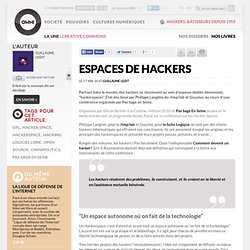
État des lieux par Philippe Langlois du /tmp/lab et Guyzmo, au cours d'une conférence organisée par Pas Sage en Seine. Organisée par Silicon Sentier à la Cantine, l’édition 2010 de Pas Sage En Seine proposait le week-end dernier un programme dense. Focus sur la conférence sur les Hacker Spaces. Philippe Langlois, pour le /tmp/lab et Guyzmo, pour la Suite Logique ne sont pas des vilains hackers informatiques qui effraient nos concitoyens. Air. Fab lab.